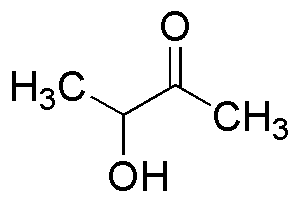Acetoin is widely utilized in research focused on:
- Food and Beverage Industry: Acetoin is commonly used as a flavoring agent in various food products, enhancing the taste of dairy products, baked goods, and beverages. Its buttery flavor profile makes it a popular choice for manufacturers looking to improve product appeal.
- Fragrance and Cosmetic Formulations: This compound is also found in perfumes and cosmetics, where it contributes to a pleasant aroma. Its ability to blend well with other fragrance components makes it a valuable ingredient in personal care products.
- Biotechnology: In microbial fermentation processes, acetoin serves as a key metabolite. Researchers utilize it to study metabolic pathways and improve the yield of bio-based products, making it essential in developing sustainable bioprocesses.
- Pharmaceutical Applications: Acetoin is explored for its potential therapeutic properties, including its role as a precursor in the synthesis of various pharmaceutical compounds. This makes it relevant for researchers developing new medications.
- Industrial Solvent: Due to its solvent properties, acetoin is used in various industrial applications, including coatings and adhesives. Its effectiveness in dissolving a range of substances makes it a versatile choice for manufacturers.
General Information
Properties
Safety and Regulations
Applications
Acetoin is widely utilized in research focused on:
- Food and Beverage Industry: Acetoin is commonly used as a flavoring agent in various food products, enhancing the taste of dairy products, baked goods, and beverages. Its buttery flavor profile makes it a popular choice for manufacturers looking to improve product appeal.
- Fragrance and Cosmetic Formulations: This compound is also found in perfumes and cosmetics, where it contributes to a pleasant aroma. Its ability to blend well with other fragrance components makes it a valuable ingredient in personal care products.
- Biotechnology: In microbial fermentation processes, acetoin serves as a key metabolite. Researchers utilize it to study metabolic pathways and improve the yield of bio-based products, making it essential in developing sustainable bioprocesses.
- Pharmaceutical Applications: Acetoin is explored for its potential therapeutic properties, including its role as a precursor in the synthesis of various pharmaceutical compounds. This makes it relevant for researchers developing new medications.
- Industrial Solvent: Due to its solvent properties, acetoin is used in various industrial applications, including coatings and adhesives. Its effectiveness in dissolving a range of substances makes it a versatile choice for manufacturers.
Documents
Safety Data Sheets (SDS)
The SDS provides comprehensive safety information on handling, storage, and disposal of the product.
Product Specification (PS)
The PS provides a comprehensive breakdown of the product’s properties, including chemical composition, physical state, purity, and storage requirements. It also details acceptable quality ranges and the product's intended applications.
Certificates of Analysis (COA)
Search for Certificates of Analysis (COA) by entering the products Lot Number. Lot and Batch Numbers can be found on a product’s label following the words ‘Lot’ or ‘Batch’.
*Catalog Number
*Lot Number
Certificates Of Origin (COO)
This COO confirms the country where the product was manufactured, and also details the materials and components used in it and whether it is derived from natural, synthetic, or other specific sources. This certificate may be required for customs, trade, and regulatory compliance.
*Catalog Number
*Lot Number
Safety Data Sheets (SDS)
The SDS provides comprehensive safety information on handling, storage, and disposal of the product.
DownloadProduct Specification (PS)
The PS provides a comprehensive breakdown of the product’s properties, including chemical composition, physical state, purity, and storage requirements. It also details acceptable quality ranges and the product's intended applications.
DownloadCertificates of Analysis (COA)
Search for Certificates of Analysis (COA) by entering the products Lot Number. Lot and Batch Numbers can be found on a product’s label following the words ‘Lot’ or ‘Batch’.
*Catalog Number
*Lot Number
Certificates Of Origin (COO)
This COO confirms the country where the product was manufactured, and also details the materials and components used in it and whether it is derived from natural, synthetic, or other specific sources. This certificate may be required for customs, trade, and regulatory compliance.


